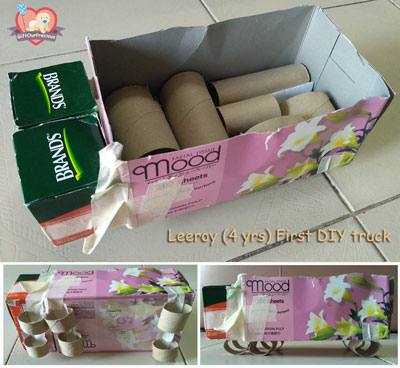
If we can only choose just one thing that we want for our children, it is for them to be happy. This is the most common answer from all parents. But how to raise happy children and what determine how happy a child is?
Every children are born with different temperament partly due to their genes but does this mean that their ultimate happiness is already predetermined?
According to Bob Murray, PhD, author of Raising an Optimistic Child: A Proven Plan for Depression-Proofing Young Children — for Life, “There may be a genetic propensity for depression, but our genes are malleable and can be switched on or off depending on the environment,”
Bob says. “The research clearly shows that happy, optimistic children are the product of happy, optimistic homes, regardless of genetic makeup.”
As per Christine Carter, PhD, author of Raising Happiness: 10 Simple Steps for More Joyful Kids and Happier Parents, on average, happy people tend to be more successful at both work and love than unhappy people. They are more likely to earn a higher salary, obtain better work performance and be more satisfied in their marriage.
So what can we parents do to create an environment to raise happier children?
Below are Top 13 Tips on How to Raise Happy Children.
1. We The Parents Need To Get Happy Ourselves
One of the most important point to raise happy children is for us, parents to be happy too.
Studies shown that happy parents tend to have happy children and that parents with depression actually seems to cause behavioral problems in their children.
Neuroscientists believe that when a person hears another person laughing, it will triggers mirror neurons in a part of the brain that makes the listeners feel as if they are laughing as well.
Hence, we should try to be with our family or friends who are often happy and laughing, as we often hear people say, “Laughing is contagious”. Hearing other peoples’ laughter will lighten our mood and also make us laugh too, our laughter will have significant impact on our children’s mood too.
Recommended Reading: Top 10 Tips on How To Be a Good Parent
2. Regular Meal Time
Have you ever felt so hungry that your mood just feels bad?
There are times when I (Mum) was so hungry that I feel like throwing a tantrum!
Can you imagine how it is for our children when they are hungry?l
Children can behave like “Monsters” when they are hungry.
A child who is usually sweet and well-behave may scream and throw tantrum when he or she is hungry.
Children who are hungry may become stubborn, cheeky, sensitive and even argumentative. Having regular meal will fuel the children’s growing brains and bodies, keeping them calm and satisfied, hence happy.
3. Regular Sleep

There are some children who are better sleeper than others, but we the parents play a major role in teaching our children to have a better sleep habit.
According to Dr. Shelly Weiss, author of Better Sleep for Your Baby & Child: A Parent’s Step-by-Step Guide to Healthy Sleep Habits and Pediatric Program Director at the Hospital for Sick Children, irregular sleep may cause problems with behavior, attention, learning, and memory.
It has been found that insufficient sleep in children, especially if they are less than 41 months old, increases hyperactivity-impulsivity and lower cognitive performance on neurodevelopmental tests.
Personally with our 4 years old son Leeroy, when he is tired and sleepy, he tends to be more hyper, cheekier and irritable. And when he is well-rested, he wakes up happier and more well-behave.
4. More Unstructured Playtime
Playtime is not goofing off. Play is important in the learning and development of our children.
Nowadays a lot of children are over-scheduled with less and less playtime both indoor and outdoor.
Unstructured play helps in the development of physical, social, emotional and intellectual well-being of our children.
Through unstructured play such as block building, role playing and outdoor play, our children can develop creativity, teamwork, negotiation skills, leadership skills, conflict resolution skills, assertiveness and how to self-regulate their own behavior and emotion.
Our son, Leeroy will usually have his daily playtime with his building blocks or snowflakes and also some outdoor play with his friends after school at the playground doing some climbing and running around playing catching.
Leeroy playing with his favorite construction toy trucks vehicles
Sometimes he would also bring his “kids scooter” along when we go out for a walk for some “scooting fun”. We (Dad and Mum) can see great development in all aspects of him such as his creativity, physical and assertiveness. It is great joy for us to watch his development.
Recommended Reading: Why Is Play Important In The Parent Child Relationship
5. Let The Child Express His Emotion
According to Bonnie Harris, author of When Your Kids Push Your Buttons: And What You Can Do About It, children who never learn to deal with negative emotions are in danger of being crushed by them as adolescents and adults.
We adults talk to our friend or punch a pillow to vent our emotion, our children also need to express their emotions.
Children ways of expressing their emotion are more primitive. Children may stomp their feet, cry and throw tantrum in public.
But rather than a lifetime of internalizing the negative emotion, which may in turn develop into future emotional issues, parents can let their children vent their emotion in their own little way before standing in to offer help.
Public shaming or shushing them do not help nor will granting their every wish help.
Parents should know that keeping our children happy in the short term by buying them toys to stop them from crying may not help in the emotional development and happiness of our children in the long term. Encourage them to unleash their creativity and create their own simple toys using paper, cardboard, empty toilet roll, tissue box etc.

Leeroy first DIY toy truck when he was 4 years old
It may be overwhelming for parents to handle at that moment, especially if our children throw their tantrum in the public, but it is all worth it to prevent our children from potential emotional problems in the future.
6. Give Them Real Responsibilities And The Opportunity To Make Choices
Many children have little control over their lives and are often told that they cannot do this or they have to do that by the adults.
Giving our children a little control and some simple responsibilities will go a long way to boost their confidence and sense of connection, two prerequisites for lasting happiness.
We often encourage and let Leeroy make some simple decisions such as to choose which shirt he wants to wear or whether we should have noodles or porridge for lunch.
“Happiness depends largely on the feeling that what we do matters and is valued by others,” observed Bob Murray, PhD.
A child as young as 3 years old can also contribute to the family by helping to do simple tasks such as feeding dry food to the pets, setting out the napkins on the dinner table and so forth.
When we, parents acknowledge our child’s contribution to the family, they will feel that they are valued, which will in turn improve his sense of self-worth and happiness.
7. Foster Connection
According to Edward Hallowell, MD, child psychiatrist and author of The Childhood Roots of Adult Happiness, “A connected childhood is the key to happiness”.
Dr. Hallowell points to a National Longitudinal Study of Adolescent Health involving around 90,000 teens, in which “connectedness” – a feeling of being loved, understood, wanted, acknowledged – are shown as the greatest preventer against emotional distress, suicidal thoughts, and risky behaviors such as drinking, drugs abuse or smoking.
Dr. Hallowell says, “if a child has just one person who loves him unconditionally, that’s the closest thing he’ll ever get to an inoculation against misery.”
However, it is not enough to just possess love for our children without expressing it, as children need to be able to feel it too.
We can foster our connection and show our unconditional love to our children by truly listening to our children when they talk, hugging our children often, reading to them, having family meals together with them, laughing together with them.
And when they mess up, forgive them and let them know we still love them anyway.
Childhood is mostly based on trial and error, our children will be happy when they know that we, parents still love them and be there for them even when they make mistakes.
“Children who grow up feeling loved deeply become adults who are prewired to love deeply.”
– Karen Salmansohn –
8. Teach Emotional Intelligence and Empathy
Emotional intelligence and empathy are not an inborn traits, they are skills that can be taught.
When our children are acting out their frustration or anger, we can relate and empathize with our children.
We can then help them identify what they are feeling, let them know that it is ok to feel those feelings but it might not be ok if they are behaving really badly due to those feelings.
When our children learn to understand their emotions, they can in turn understand the emotions of others better, hence they can also learn to empathize and relate to others better as well.
We, parents can foster emotional and empathy in our children in situation such as when other children fell down at the playground and cry, we, parents can ask our children why they think the other children are crying.
We can then encourage our children to shown their concern and help the other children.
This not only help our children to build essential skills and make our children better person, research also shows that it will make our children happier person in the long run.
9. Teach Them Relationship Building
According to Christine Carter, PhD, executive director of the University of California at Berkeley’s Greater Good Science Center, “We know from 50 years of research that social connections are an incredibly important, if not the most important, contributor to happiness.”
Carter advises that parents should provide our children with opportunities to form loving connections with others as well.
We, parents can arrange play-dates for our children to play with other children and encourage our child to perform small acts of kindness, such as sharing their toys with other friends during play-dates or sharing their snacks.
When friends are back to school from sickness or hurt from a fall, we can encourage our children to show their concern for their friends by asking their friends how they are feeling and showing empathy to them.
When Leeroy play with his school friends after school, there were times when his friends cried from pain when they fell down and hurt themselves.
I (Mum) would encourage Leeroy to go to his friends and show his concern. My son would go to them and asked if they are ok and gave his friends a hug or pat on the back and comfort them.
10. Praise Our Child For Effort, Not Perfection
Parents should praise our children for their effort instead of their natural ability such as being intelligent or beautiful.
A research done shown that children who were praised for their intelligence wanted to do easier puzzle so as not to risk making a mistake and losing their “smart” status.
Whereas more than 90 percent of the children encourage with growth mind-set chose harder puzzle.
When our children are praised for their effort, they will learn that effort and hard work will lead to success and will be more willing to engage in the process of learning.
Christine Carter says, “Studies show kids with a growth mind-set do better and enjoy their activities more because they aren’t worried what people will think of them if they fail.”
Research also shown that children can be instill with growth mind-set with simple praise such as “You did very well, you must have worked really hard on this”.
Therefore, we, parents should focus on praising our children on their effort more than the achievement itself.
For example we can say “Your persistence have paid off” or “I can see how hard you have work on this project. Well Done!”
11. Allow for Success and Failure
We, parents should provide our children with opportunities to master new skills without overly emphasizing on achievement.
Children learn through trial and error.
Parents’ constant intervention may undermine children’s confidence, which in turn may hinder their motivation for self-learning.
Many parents make the mistake of assisting too much in their children’s learning process as they cannot bear to see their children struggle or fail when they learn to walk, when they learn to feed themselves or when they are doing their projects.
We, parents need to manage our anxiety to control and let our children flourish and develop their competence, which in turn will help to build their confidence.
We can be there to observe them, encourage them and when required, guide them.
Thereby providing them with the opportunities to experience failure and success, which in turn help develop their self-competence and self-confidence.
Recommended Reading: 12 Tips to Building Resilience and Confidence in Children
12. Teach Optimism
Optimism is the belief that good things will happen in the future and that we can bring about positive change to our life and to the world.
According to Karen Reivich, PhD, co-author of two books: The Optimistic Child and The Resilience Factor, optimism is a critical skill for happiness, health and success.
Children who are taught to face the world more optimistically are less likely to face depression or anxiety and are more successful in school.
They will also grow up to be more resilient and live longer.
We, parents can encourage our children to be optimistic in our daily life such as to focus our children on positive things that happen to them daily.
We can ask them what make them happy that day or ask them to share something good that happened to them that day.
We can also give them frequent positive encouragement which will help them to build a positive and optimistic subconscious mind to self-encourage themselves in their lifetime.
13. Practice Habitual Gratitude
Studies has consistently show positive relationship between feelings of gratitude to emotional well-being of people.
People who have the habit of writing gratitude journals feel more optimistic, achieve more results reaching their goals and feel better in their lives.
Parents can encourage their children to form a habit of sharing the things that they are thankful for that day on a daily basis, such as when they are having family meals together or before sleep.
Regular feelings of gratitude foster consistent positive emotions which can lead to lasting happiness.
Sources:
http://time.com/35496/how-to-raise-happy-kids-10-steps-backed-by-science/
http://www.huffingtonpost.com/katie-hurley/secrets-of-highly-happy-children_b_3722259.html
http://www.parents.com/toddlers-preschoolers/development/fear/raising-happy-children/
http://www.livescience.com/17894-10-scientific-parenting-tips.html
http://www.livehappy.com/relationships/parenting/how-raise-happy-kids
https://www.todaysparent.com/family/parenting/how-to-raise-an-optimistic-child/
https://www.healthambition.com/why-is-sleep-so-important/


